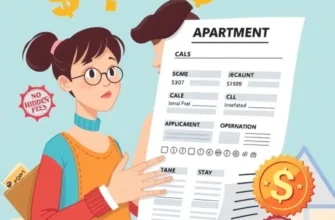Renting your first apartment or house can feel like a thrilling—yet slightly terrifying—adventure. While the excitement of unlocking that front door can sweep you off your feet, lurking behind it could be a nasty surprise hidden in a deceptive rental listing. Rental fraud is on the rise and young adults, first-time renters, and budding families are often prime targets. With everything from fake landlords to sketchy payment methods, the rental market can feel like a game of ‘who can guess the fraudster?’ But fear not, this guide provides practical tips filled with wit and wisdom to help you dodge the pitfalls. By following a few simple steps, you can sign that lease with confidence, rather than the fear of losing your cash or your sanity. So, grab your notepad—or your favorite notes app—and let’s delve into how you can get the keys to your dream home without handing over your hard-earned cash to a scammer!
Spotting the Red Flags: Common Scams in the Rental Market

In the pursuit of the perfect rental, young renters are increasingly targeted by savvy scammers. These con artists exploit the pressure and urgency often felt in competitive rental markets. Let’s explore some of the most common rental scams that young renters should watch out for.
One prevalent scam involves fake listings. Scammers create enticing ads with beautiful images of apartments that don’t exist. The rate is usually lower than the market value, aiming to attract more interest quickly. Victims might first encounter these listings on legitimate property websites or community boards. However, upon contacting the supposed landlord or agent, they are told the property is in high demand and are pressured to send a deposit before seeing the place. To avoid falling for this, never send money without seeing the property first and always verify the property’s address through a maps service to ensure its existence.
Another significant threat is phishing attempts. In these scams, fraudsters pose as property managers or landlords requesting personal and financial information. They may contact prospective renters via email, presenting a convincing company front. Typically, the email links to fake websites mimicking legitimate property management companies. To protect against phishing, be skeptical of emails asking for personal information and always check the sender’s email address closely. Look for inconsistencies or slight misspellings in both the email and the web addresses.
The issue of landlord impersonations is also prevalent. In this scheme, scammers gain access to vacant properties and present themselves as the owners or legitimate landlords. They may even break into the property to show it to unsuspecting renters. The fraudsters then collect deposits and disappear, leaving the victim stranded. Always ask for identification and proof of ownership from the landlord. Cross-reference their details with public records or verified landlord directories.
Besides these tactics, renters should look for additional red flags such as landlords who are unavailable for meetings or refuse video calls. Another warning sign could be landlords or property managers who only communicate through messaging apps. The lack of transparency is often a sign that something is amiss.
Lastly, any request for payment through unconventional methods like wire transfers or gift cards should ring alarm bells. Scammers prefer these methods because they are difficult to trace. Insisting on secure payment methods such as checks or banking transfers can help reduce the risk of falling prey to fraud.
Renters looking to protect themselves might find additional tips on reviewing rental neighborhoods helpful. For guidance, consider this comparison of rental neighborhoods to ensure the area complements your lifestyle and is not just a scam haven.
By staying informed and practicing due diligence in the rental process, young renters can protect themselves from common scams that prey on the unwary and preserve their peace of mind during the search for a new home.
Smart Renting: Steps to Secure Your New Home Safely

Finding a rental that fits your needs can be as thrilling as it is daunting. To navigate this process safely and confidently, invest your energy into several key areas. Equip yourself with the knowledge to safeguard against potential pitfalls.
Start by verifying landlord identities. A simple Google search is not enough. Dig deeper by checking their contact information through official platforms. Government property records can also give you insights into ownership, verifying whether the “landlord” indeed owns the property. Engaging a third party, such as a property management company, can further legitimize the process, lending an extra layer of security.
Next, examine the apartment or house in person whenever possible. Virtual tours offer convenience, but nothing beats walking through the space yourself. Look for consistency between what is listed online and what is actually present. Physical inspections provide an opportunity to spot potential issues, such as roofing problems that might otherwise go unnoticed until after you move in.
When it’s time to discuss payment methods, remember that secure transactions are paramount. Avoid methods like wire transfers or dealing in cash, as they offer minimal recourse if something goes wrong. Opt for payment platforms that protect both parties, providing a traceable and verifiable way to handle money.
Understanding your rental agreement is another cornerstone of safe renting. Before signing, scrutinize every clause. This may mean seeking legal advice or asking trusted friends with rental experience to help dissect terms that are unclear. Pay extra attention to sections about deposits, maintenance responsibilities, and duration of tenancy. Knowing what you are agreeing to prevents nasty surprises later.
Furthermore, always document all transactions and agreements. Keep copies of agreements, receipts, and any correspondence with the landlord. A well-documented paper trail can be invaluable if disputes arise.
In this era of tech-savvy scams, trust your instincts. If something feels off—whether it’s overly rigid rules, pushy requests for information, or landlords who refuse to meet in person—consider it a red flag. It might be a good time to step back and reassess.
Leverage online resources to gather reviews and experiences from previous tenants, which can provide insight into the reliability of the landlord and quality of the property. Apartment hunting communities often share listings and red flags to look out for, which can be a powerful ally in your search.
Finally, it’s essential to familiarize yourself with local rental laws. These protections vary by location and can play a crucial role in resolving any disputes that arise.
By taking these proactive steps, you can better shield yourself from fraud and ensure your renting experience is as secure and stress-free as possible.
Final words
Navigating the rental market can be overwhelming, especially for young adults and first-time renters, but with the right tools and vigilance, you can conquer the world of rentals. By keeping an eye out for those sneaky red flags and arming yourself with knowledge about safe renting practices, you’re already halfway to finding a great home without falling victim to fraud. Remember, if it sounds too good to be true, it probably is. So, take a deep breath, trust your instincts, and soon enough, you’ll be basking in the joy of your new keys—without worrying about the troubles that come from rental scams.









